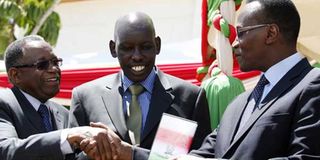Govt abolishes student and school ranking on exam performance

Education Secretary Jacob Kaimenyi (right) with Principal Secretary Belio Kipsang (centre) and Kenya National Examinations Council chairman Kabiru Kinyanjui at a past event. The government has abolished the ranking of secondary school students according to their performance in national examinations. FILE PHOTO |
What you need to know:
- The rules are part of a series of measures the government has issued to guide officials and school administrators in managing secondary schools.
- In the regulations that take effect from January next year, schools have been asked to procure uniform for students through open tender system.
The ranking of schools in national examinations has been banned to eliminate cut-throat competition among institutions.
Form Four and Standard Eight candidates will also not be ranked on the basis of their scores.
The new rules come into effect with those who sat the exams this year. The new policy is expected to end unethical practices by teachers in the rush for top positions.
Form One selection will now be determined by quotas, performance, affirmative action and the candidates’ school choices, according to a circular sent to schools this week.
This effectively means that candidates from public primary schools will secure more places in the national and top county schools compared to those from private schools. “Ranking of schools and students on the basis of national examination results, therefore, is discontinued with immediate effect,” says Education Principal Secretary Bellio Kipsang in the circular copied to county and district education officials.
However, the circular does not prescribe an alternative criteria to be used in gauging performance of schools and their candidates. It only spells out a raft of new guidelines and regulations aimed at improving school management and lowering learning costs.
The directive brings to an end a tradition in which national exams have been used as the only tool for grading schools.
The ranking method has been cited as a leading cause of unethical routine by some schools where bright candidates are registered in different streams from the rest to maintain top slots in the national list
Some schools have also been forcing weak learners to repeat classes while registering the weak ones in satellite schools.
CONDUCT REGULAR VISITS
Dr Kipsang says the government will conduct regular visits to schools to see if the new rules are being followed.
The rules are a blow to private schools because they retain the contentious Form One selection formula that favours pupils from public schools in admissions to the elite national schools.
The method has been challenged several times in court by private schools whose pupils have missed out on national school places despite attaining high marks in the examinations.
The formula is based on the notion that learners in private schools enjoy access to superior teaching materials and enough teachers as opposed to their counterparts in public schools.
“The number to be admitted from either public or private primary schools will be proportionate to the candidature in either category,” Dr Kipsang says in the regulations to be enforced in January.
The rules also put a stop to conversion of day schools into boarding schools unless approval is obtained from the Cabinet Secretary.
THREE STREAMS
County Education Boards have also been ordered not to register any new schools without clearance from the Cabinet Secretary.
New schools will only be sanctioned on the basis of their viability as determined by their proximity to other schools and the number of people in the area.
Public boarding secondary schools will have at least three streams with a class size of not more than 45 students each.
“Day schools already established in immediate neighbourhoods and have not raised a minimum of two streams with a class size of 45 that makes them viable will be merged except in arid areas where those with a single stream of as low as 25 in a class will be considered.”
The regulations are from recommendations of a task force on secondary school fees, chaired by former assistant Education minister Kilemi Mwiria.
In line with the task force’s recommendations, Dr Kipsang says public schools will be classified into three categories for the purpose of disbursement of grants, boarding, day and special schools. But for selection of Form One candidates, public schools will be classified into national, extra-county, county, sub-county and special.
As a result of the classifications day schools will be expected to charge annual fees of Sh11,105, boarding Sh38,969 and special schools Sh22,830. The government is expected to provide a subsidy of Sh12,780 per student per year for the regular schools and Sh32,605 for special schools.
The circular also asks the Teachers Service Commission to review the work load of teachers and cautions against employing many teachers on contract, a trend that leads to high learning costs.




